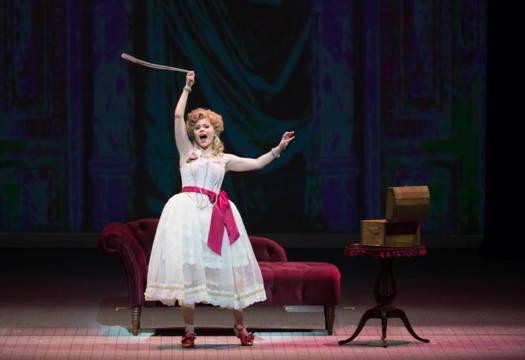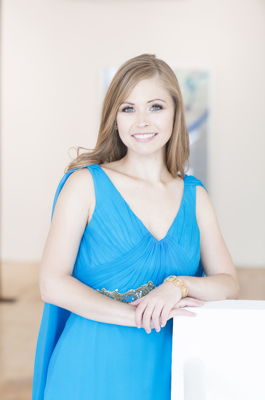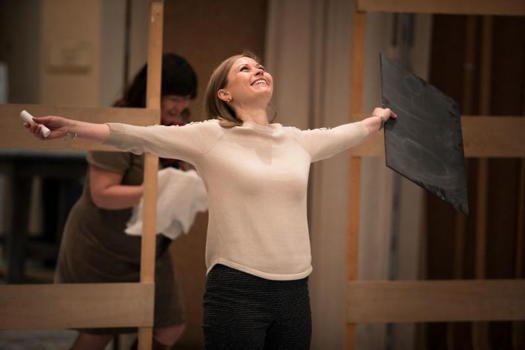- Meistersinger
- John Wilson
- Michele Enrico Carafa di Colobrano
- Andy Garbi
- Nancy Van de Vate
- Handel: Tolomeo
- London Mozart Players
- Ivan Galamian
 SPONSORED: CD Spotlight. A Fascinating Recording - John Joubert's string quartets, heard by Alice McVeigh.
SPONSORED: CD Spotlight. A Fascinating Recording - John Joubert's string quartets, heard by Alice McVeigh.
All sponsored features >>
 DISCUSSION: John Dante Prevedini leads a discussion about Composers, individuals or collective?, including contributions from David Arditti, Halida Dinova, Robert McCarney and Jane Stanley.
DISCUSSION: John Dante Prevedini leads a discussion about Composers, individuals or collective?, including contributions from David Arditti, Halida Dinova, Robert McCarney and Jane Stanley.
PRODIGIOUS APPETITE FOR REPERTOIRE

RON BIERMAN talks to
coloratura soprano Alisa Jordheim
coloratura soprano Alisa Jordheim
Coloratura Alisa Jordheim will be debuting in the role of Gilda with baritone Stephen Powell in a San Diego Opera production of Verdi's Rigoletto. He's sung the lead five times, the first time in a Cincinnati Opera production in which Jordheim had only a few lines as a page. She said, 'I feel like I've graduated. That was in 2011, and I was a graduate student at CCM, the University of Cincinnati College-Conservatory of Music. It was a wonderful experience for me just to soak up everything in the rehearsal process. One of my favorite singers, Sarah Coburn, was the Gilda. Just getting to see her portray that character and to work with Stephen was a master class.'
She said making a house and role debut in San Diego caused 'some nervousness coming in. You know Stephen has done his role many times, and this is my first time.
But everybody's been wonderfully supportive and nurturing. I feel like it's a safe place for me to try out new things. Conductor Steven White has been wonderfully accommodating with tempos and different traditions of ending on the octave and other stylistic decisions.'
In an hour's conversation with Jordheim at San Diego Opera's Civic Center rehearsal room I found she had an extraordinary diversity of activities and interests that extended to repertoire, operatic composers, teaching, travel, and even pop music. 'I love having an eclectic mix of things in my life in all areas.' On the way to a Doctor of Musical Arts degree in Voice Performance at CCM she became a State-Tested Nursing Assistant in Ohio. In her home state of Wisconsin she worked as a physician's record-assistant in the emergency room at Appleton Medical Center.
No matter how random her activities sometimes seem, they are always somehow interrelated. Her early interest in medicine and caring for others has given her a good understanding of how to deal with the taxing physical requirements of operatic singing, something she explains when coaching. Holding back during rehearsals (marking), for example, is one way to maintain vocal health. Because the role of Gilda is new to her, she finds a benefit in singing it at least once as she would in performance, but otherwise saves full voice strength for opening night. 'When marking I take things an octave lower and sing a little softer to save energy. It's a matter of listening to your body - it's best not to sing it out when your vocal folds are a little tired. And you definitely just want to mime screaming at football games!'

Alisa Jordheim. Photo © Rebecca Fay
The breadth of her interest in different musical genres is tied to her respect for the singers in each of them. 'I enjoy singing different genres and styles of music. I love doing musical theater, I love doing art songs.' In a previous interview she'd said she admired Jessica Vosk, the rock group Panic! At the Disco, and Astor Piazzolla, among others. Vosk starred in Wicked on Broadway, and Panic! At the Disco's Brendon Urie sang in the musical Kinky Boots. 'Vocally he's got it figured out.' She admires the stamina of Broadway singers who perform so frequently, but said, 'My heart is in opera. It's a heightened way of telling stories. The unamplified voice is such a unique thing.'
Piazzolla is a special case. Her mother and father are musicians and professors at Lawrence University where she studied for two years before transferring to CCM. Her father introduced her to the tango composer, and she sang his music in arrangements that included dad's saxophone.
Jordheim began voice training when she was ten, not necessarily a good age because the voice can be damaged if not used correctly, and it changes at puberty. She credits her coach for taking that into consideration. 'My teacher Patrice Michaels was wonderful. She was masterful at introducing me to material that was appropriate. I started singing musical theater repertoire in a conservative range with nothing terribly high. I think my first aria was Barbarina's, and that was my first introduction to opera.' She's now sung in The Marriage of Figaro three times. This is a brief clip from one of her performances as Barbarina.
Jordheim also credits Michaels for introducing her to vocal technique, styles, languages and the International Phonetic Alphabet (IPA), the tool used to transliterate opera librettos into a form that helps singers with the accent and diction a composer had in mind, a skill necessary for correct musical phrasing. The early introduction to IPA influenced her subsequent degree track. As a Fulbright Scholar and Fellow of the American-Scandinavian Foundation, while earning her Doctor of Musical Arts she studied and conducted research on singing diction in the Scandinavian languages at the University of Oslo.
Because Jordheim's parents both taught at Lawrence, the University was the center of her early musical training. After ten years as her coach, including Jordheim's two years as a student at Lawrence, Michaels recommended a transfer to another school to broaden her educational experience. The soprano took that advice, and transferred to CCM where she met Bill McGraw, a baritone singer and professor of voice who became her primary vocal coach. 'He helped me so much about technique and musicality and breathing. All the things one needs for longevity and career. When I'm in rehearsal or teaching myself, I always think back on what Bill would say. More recently I have a coach in Milwaukee where I lived for several years. Her name is Janna Ernst. She's actually from San Diego and went to San Diego State. She's helped me prepare for this role.'

Alisa Jordheim in Bernstein's 'Candide'. Photo © Bruce Bennett
More experienced opera singers have also helped her develop and manage her career. 'I shared a dressing room with Hei-Kyung Hong when we were in Dialogues of the Carmelites. She's a singer I've admired for a long time. I tried not to fan-girl her too much, but she told me how she got started and gave me some advice about how to balance career with personal life. The whole time I was thinking, oh my gosh! It was a wonderful experience. And then getting to sing with Denyce Graves recently in Candide was - I kind of had to pinch myself. She's such a glamorous woman and such an elegant singer.'
Jordheim's performance as Cunégonde in Palm Beach Opera's production of Candide produced one of the most satisfying moments so far in her budding young career. 'Glitter and Be Gay' is a key aria. 'It's fun and terrifying at the same time, especially with props to worry about. I thought I'd done pretty well, but I'm never totally satisfied. Maybe this note could have been a little brighter. But the applause just kept happening.' In this clip she sings the same aria in a concert setting.
Of course, things don't always go as planned. 'Stephen Powell and I were talking about how entertaining it can be when things go wrong. It keeps you on your toes. You have to think of a solution, you know, when someone forgets a prop or starts spouting random nonsense at you.' It turns out she was thinking of an example of the latter. 'There was a Barber of Seville dress rehearsal. In a recitative with Doctor Bartolo the words just were not there for me. It seemed like about twenty-five minutes, but it was probably only ten seconds, and I just sort of made up a language with no Italian, just random vowels.' The singer in the role of Bartolo got a puzzled what's-happening expression. But, 'You can't just stop! The show must go on, so you have to improvise.'
A prodigious appetite for repertoire extends to contemporary composers. She's recorded Fresh Patterns, a song cycle written for her by Lori Laitman and also premiered works composed for her by Douglas Pew, Joanne Metcalf, Josh Deutsch, and Rodney Rogers. She sang Lola in the world premiere and commercial recording of Sister Carrie, written by Grammy award-winning composer Robert Aldridge and librettist Herschel Garfein.

Alisa Jordheim. Photo © Rebecca Fay
The soprano's most unexpected role came as the voice of Bel in the animated short film Over the Horizon, written and directed by David Pierson. 'I've sung quite a bit with the New Philharmonic in Glen Ellen, Illinois, and the gentleman who does the lectures said I'd be perfect for the animated film his son was working on. I thought, that would be fun! So I met with his son. It was odd to have just a microphone with no people. But it really was fun. It's a short film, around fifteen minutes, about a robotic character who meets another robotic character in a kind of dystopian world. They each have a deep need to meet someone else like themselves.'
Commenting on singing new music, Jordheim didn't seemed phased by the technical difficulties of odd leaps or unusual harmonies. 'The hard thing is that you don't have a historical recording. But I love the challenge. There's something really wonderful about being the first. To put your stamp on a role as part of the original cast.'
Jordheim has been relying on Guy Barzilay Artists in New York for bookings and career advice for nearly five years years, and recently moved to New York because she'd been traveling there so often for auditions. 'They really have good ideas about repertoire and career trajectory for me. Repertoire is so important. It shows what you can do and what you can't.' And as the voice changes over time, repertoire changes. 'I used to feel super comfy hanging out in the stratosphere for a long period of time, and now, while I still enjoy hanging out up there. I really love singing low notes. I find that I get a little more richness in the low and middle-range and that's exciting.' It expands the number of roles she can take on. 'I hope to be able to sing anything.' When I jokingly asked if she envisioned a progression from page to Gilda to the baritone lead in Rigoletto, she laughingly admitted there were limits.

Alisa Jordheim in rehearsal. Photo courtesy of San Diego Opera
Later this year Jordheim will be an artist-in-residence at Temple University, standing in for a friend while she's on maternity leave. And amidst teaching and coaching she'll be singing Ninetta in The thieving Magpie by Rossini. A Merry Widow is also in the works.
I'm looking forward to seeing her as Gilda next weekend.
San Diego, USA


